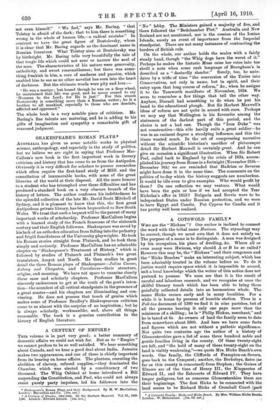SHAKESPEARE'S ROMAN PLAYS.*
AUSTRALIA has given us some notable works in physical science, anthropology, and especially in the study of politics, but we believe we are right in saying that Professor Mac- Callum's new book is the first important work in literary criticism and history that has come to us from the Antipodes. Obviously it is very difficult for scholars to pursue researches which often require the first-hand study of MSS. and the consultation of innumerable books, with none of the great libraries of the world at their disposal. All the more honour to a student who has triumphed over these difficulties and has produced a standard book on a very obscure branch of the history of letters. The author confesses his indebtedness to the splendid collection of the late Mr. David Scott Mitchell of Sydney, and it is pleasant to know that this, the first great Antipodean private library, has been bequeathed to New South Wales. We trust that such a bequest will be the parent of many important works of scholarship. Professor MacCallum begins with a learned study of the French Senecans of the sixteenth century and their English followers. Shakespeare was saved by his lack of an orthodox education from falling into the pedantry and frigid fancifulness of the University playwrights. He took his Roman stories straight from Plutarch, and he took them simply and seriously. Professor MacCallum has an admirable chapter on " Shakespeare's Treatment of History," which is followed by studies of Plutarch and Plutarch's two great translators, Amyot and North. He then studies in great detail the three Roman plays of Shakespeare—Julius Caesar, Antony and Cleopatra, and Coriolanus—their structure, origins, and meaning. We have not space to examine closely these sane and scholarly chapters. Professor MacCallum sincerely endeavours to get at the truth of the poet's inten- tion—the soundest of all critical standpoints in the presence of a great master—and his chapters are illuminating and con- vincing. He does not possess that touch of genius which makes some of Professor Bradley's Shakespearean criticism come to us almost with the surprise of an inspiration ; but hp is always scholarly, workmanlike, and, above all things, reasonable. The book is a genuine contribution to the history of English literature.














































 Previous page
Previous page